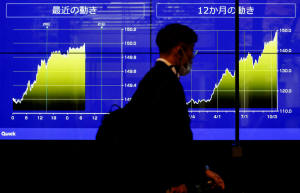Relief over Poland missile dents dollar flows; stocks retreat
 Send a link to a friend
Send a link to a friend
 [November 16, 2022] By
Amanda Cooper [November 16, 2022] By
Amanda Cooper
LONDON (Reuters) - Global stocks eased from
two-month highs on Wednesday while the safe-haven dollar fell, after
Poland's president said a missile that hit his country was probably a
stray Ukrainian defence projectile, dispelling fears that it originated
from Russia.
Initial relief was enough to encourage some flows back into equities and
commodities, but given the big gains of the last couple of weeks,
investors took the news as an opportunity to book some profits, not
least given the vulnerability of the economic backdrop in Europe and
China in particular.
"It is the worst when we hear such news, even if it's not from Russia,
this still causes uncertainty in the markets and the European market is
especially fragile heading to a confirmed recession next year due to the
energy crisis and geopolitical tensions," Raed Alkhedr, chief market
analyst at Equiti.com, said.
In Europe, shares slipped, with the STOXX 600 off 0.7%, down from
Tuesday's two-month peak, depressed by the auto sector after a report
that Germany's Mercedes Benz cut its China electric vehicle prices as
sales lagged.
Germany's DAX dropped 1.1% while Britain's FTSE 100 eased 0.1%

The MSCI All-World index was virtually unchanged on the day, having
fallen by as much as 0.2% overnight when news of the explosion in
Poland, which killed two people, broke.
When the missile struck, NATO member Poland first said a Russian-made
rocket was responsible and summoned Russia's ambassador to Warsaw for an
explanation after Moscow denied it was responsible.
The dollar, which acts a safe haven in times of geopolitical or market
turmoil, rallied as much as 0.7% overnight, before tracking lower in
European trading. It was down 0.4% against a basket of major currencies.
[to top of second column] |

A passerby walks past an electric
monitor displaying the graph of recent movements on Japanese yen
exchange rate against the U.S. dollar in Tokyo, Japan, October 20,
2022. REUTERS/Issei Kato/

"The initial reaction was understandable given that any deliberate
strike on a NATO member would mark an enormous escalatory step,"
Deutsche Bank strategist Jim Reid said.
"It soon became apparent that this was highly unlikely to be a
direct attack."
U.S. stock futures gave back earlier gains, with S&P 500 e-minis
down 0.1% and Nasdaq 100 futures down 0.2%.
The euro, which hit its highest since early July this week, was up
0.7% on the day at $1.0418, while sterling was up 0.2% at $1.1895
after UK data showed consumer inflation picked up by a lot more than
expected in October.
With political tensions injecting some volatility into markets,
benchmark 10-year Treasury yields fell 2 basis points to 3.777%,
nudging their lowest in a month.[US/]
Gold rose 0.2% on the day to $1,776 an ounce, buoyed by a weaker
dollar, while Brent crude futures was steady at $93.85 a barrel,
having retreated from an overnight high of $94.79. [GOL/] [O/R]
(Additional reporting by Shreyashi Sanyal in Bengaluru, Ankur
Banerjee in Singapore and Xie Yu; Editing by Edwina Gibbs, Edmund
Klamann, Simon Cameron-Moore and John Stonestreet)
[© 2022 Thomson Reuters. All rights
reserved.]
This material may not be published,
broadcast, rewritten or redistributed.
Thompson Reuters is solely responsible for this content.
 |